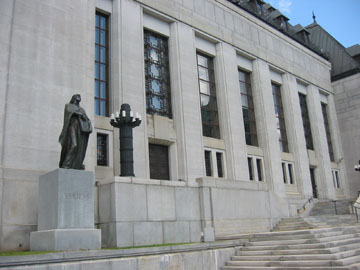
This week, the Supreme Court of Canada will hear four appeals, including the hugely important 16-year-old challenge of the late Harry Daniels, a Métis leader who sought a declaration that Métis and non-status aboriginals were “Indians” for constitutional purposes. The court will also hear a couple of cases on institutional delay and the right to be tried within a reasonable time.
 Oct. 7 – British Columbia – Jordan v. R.
Oct. 7 – British Columbia – Jordan v. R.
Charter of Rights: The applicant was charged with drug trafficking offences in 2008 related to a “dial-a-dope” operation selling cocaine and heroin. In September 2012, he applied for a judicial stay of proceedings, arguing the 32-month delay had violated his Charter right to be tried within a reasonable time. The Crown blamed the problem on “institutional delay.” The SCC will review how these kinds of delays should be weighed in determining stay applications.
Read the British Columbia Court of Appeal’s decision
Related news stories:
Four years later, couple finally faces drug trial, Surrey Now
Oct. 7 – Ontario – R. v. Williamson
Charter of Rights: The respondent, a former teacher, was charged with sexual offences against a young boy committed more than 30 years ago. He was arrested in January 2009. As a result of numerous delays, the trial by jury did not take place until December 2011. The respondent was convicted, but the verdict was thrown out at the Ontario Court of Appeal, which ruled that the delay violated the respondent’s Charter rights. The SCC will review whether the appeal court erred in its assessment, given that the respondent was out on bail at the time and still being paid as a teacher under suspension. A publication ban is in place.
Read the Ontario Court of Appeal’s decision
Related news stories:
Ex-teacher gets four years in prison for molestation, Kingston Whig-Standard
Teacher convicted of sodomizing 12-year-old 50 times has conviction thrown out, The Globe and Mail
Oct. 8 – Federal – Daniels v. R.
Constitutional law: Métis leader Harry Daniels launched a constitutional challenge in 1999 against the federal government’s exclusion of Métis and non-status Indians from its definition of the term “Indian” as it applies to rights and obligations under the Constitution. Daniels sought a judicial declaration that Métis and non-status Indians are, in fact, “Indian,” and that the Crown owes the same obligations to them. The challenge succeeded at the Federal Court but was limited only to Métis people at the Federal Court of Appeal, which determined that non-status Indians should be assessed on a case-by-case basis. The SCC will determine whether the appeal court erred in limiting the declaration.
Read the Federal Court of Appeal’s decision
Related articles:
Who are ‘Indians’ within Parliament’s legislative authority and why does it matter? canadianlawyermag.com
Supreme Court to decide rights of Méties and non-status Indians, Toronto Star
Supreme Court to hear landmark case of off-reserve aboriginal people, CBC
Oct. 9 – Quebec – Rogers Communications v. Châteauguay
Constitutional law: Rogers Communications sent the city of Châteauguay notice that it intended to build a cellphone tower at a particular location. The city issued a construction permit, but when citizens mobilized against the project, it offered another location. Rogers, however, opted for the first location. The city then issued a notice of land reserve. At trial, Rogers argued the city’s actions amounted to abuse of authority and interference with federal jurisdiction over telecommunications. The appeal court decided the city did not overstep its constitutional powers. The SCC will review the powers of municipalities over construction of telecom towers.
Read the Quebec Court of Appeal’s decision